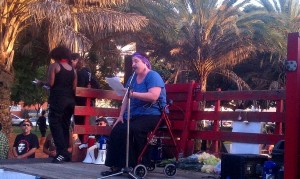October 22 Speech Against Police Brutality

I am grateful for the opportunity to speak to you today at this October 22 demonstration against police brutality on the theme, Resistance Matters, focusing on a segment of EVERY community– people with dis-abilites.
People with dis-abilities are specifically targeted by police for abuse and brutality.
People who are deaf, unable to heed orders they do not hear, unable to communicate with authority, often are killed or battered by a system that doesn’t take their communication needs into consideration.
People with visible dis-abilities attract the attention of bullies, including the bullies in blue who know that there are no consequences for our ostracism or victimization.
People who appear, walk, talk differently are often singled out, accused of being drunk, and often have trouble with law enforcement because of both misunderstandings and the outright hostility toward us, by the police.
People with mental health conditions come in contact with police on the street, when our behavior doesn’t conform to society’s expectations, or when police are called to respond to medical emergencies.
Homelessness and prisons ARE our society’s mental health care system.
Police often respond to medical psychiatric emergencies with brutal and often deadly force, claiming they felt that they were in imminent danger.
Imagine if health care providers said they had to kill a patient because the patient’s condition threatened the lives of health care professionals.
It is the job of health care providers to treat people who are ill. We must demand no less of emergency personnel, including police, when answering a call for medical emergencies.
___________________
There is a nexus of gender, class and race with dis-ability, compounding our experience with authorities. We are part of every community, not a separate group, or geographic. There is no organization or outreach that can fully succeed without our full inclusion. You cannot address the issue of police brutality without also addressing the role of people with dis-abilities in the struggle for social justice.
Yet many social justice organizations don’t include people with dis-abilities fully, in addressing many social justice issues, and often perpetuate attitudes and policies that contribute to our marginalization.
You can’t defend our rights without our participation, our full participation. Nothing about us, without us. Working on our behalf without us, simply appropriates our exploitation in the service of rhetoric.
A movement that isn’t informed by the victims perpetuates the abuse. Planning that does not take our specific needs and issues into consideration often puts us in significant danger. Too often event security responds to us in much the same way that the state does. I have been at demonstrations where the event coordinators did as much to endanger us, as the police do. This must be changed, this must be challenged.
We cannot fight a system by replicating its attitudes & practices. We cannot demand from society what we cannot also create among ourselves.
Expectations of people with dis-abilities merge with issues of race/gender and class to increase marginalization via expectations of behavior.
Thinking of people with dis-abilities as aberrant, undesirable, non-contributing and a burden have no place in the movement, these are capitalist attitudes.
Dis-ability rights isn’t charity. nothing short of full inclusion is justice. It is not your place to “help” us, but rather to work with us, to include us in ways that inform praxis.
It is NOT our job to make you comfortable with out conditions.
It is NOT our job to find our own way into your organizations.
It is NOT our job to say what you want to hear, and to leave our particular needs and experience out of the discussion.
Dis-ability inclusion is the collective responsibility of the entire community.
________________
Additionally, agents of repression know to use dis-ability to divide the movement, like they use gender & race; by relying on our own prejudice & bigotry.
Infiltrators use ridicule of people with dis-abilities. Police have been known to “street: us into demonstrations to provoke an angry crowd that knows we are acceptable targets.
These divisive tactics don’t work when we check ourselves, our own entitlements that mask as privileges that defeat us all. We cannot build a sincere movement w/o including the most marginalized sectors, and we cannot address police brutality by ignoring its specific nexus with dis-abilty .
_______________
It must also be recognized that police not only target people with dis-abilities for abuse, but also, in their brutality, create dis-ability, leaving those who survive, injured and traumatized. Let us honor those comrades wounded in the struggle, injured by capitalism, with ramps, sign language & voice, as well as make room for all activists into the future, as any one of us can become a person with a dis-ability, at any time.
No more excuses. These are matters of resistance because resistance matters.
So, let us build the strongest resistance to police brutality and state hegemony by ever increasing the circle, by standing, sitting, signing, rolling arm in arm in solidarity, a strong movement that cannot afford to leave anyone behind, a movement that needs everyone’s voice, everyone’s story.





